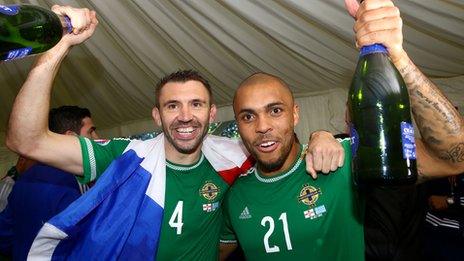Michael O'Neill: Mastermind behind Northern Ireland success
- Published
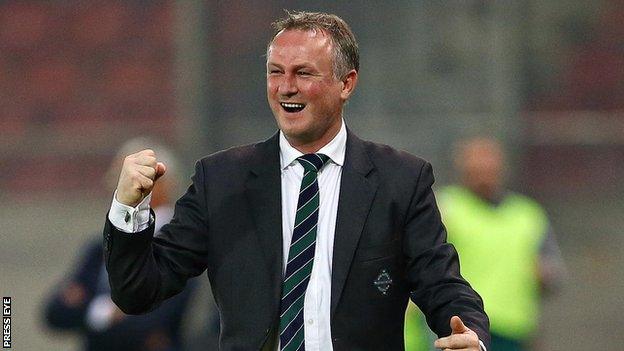
NI manager Michael O'Neill celebrating on the touchline has become a familiar sight during the Euro 2016 qualifying campaign
No greater compliment could be paid to Michael O'Neill than that his management style resembles that of Billy Bingham - the man who steered Northern Ireland to the 1982 and 1986 World Cup finals.
For the 46-year-old, bridging a 30-year gap since those glory days by masterminding his country's passage to the Euro 2016 finals is a very personal triumph, as well as a collective one.
Indeed, from the moment qualification to next year's tournament in France was secured, O'Neill was catapulted into legendary status in Northern Ireland footballing folklore, his name mentioned in the same breath as Bingham and Peter Doherty, who was at the helm for the 1958 World Cup in Sweden.
Back in December 2011, the fortunes of the national team were at a low ebb when the former midfielder edged out good friend Jim Magilton, his former assistant at Shamrock Rovers, and Iain Dowie, to become Nigel Worthington's successor.
Despite limited managerial experience, O'Neill's potential to coach at a higher level was highlighted by leading the Dublin-based League of Ireland side to the group stages of the Europa League, the first Irish team to progress that far in a European club competition.
A disappointing World Cup qualifying campaign, which yielded just one win from 10 matches, put him under pressure to improve results, but those of influence in the Irish Football Association kept faith.
Far from a 'golden generation'
Since then, O'Neill and his team have put the pride back in the green jersey, travelling on an astonishing journey which has culminated in ensuring a first appearance at a major tournament for three decades.
The Northern Ireland boss has succeeded in galvanising his team into a formidable force in Europe, instilling a sense of resolve, belief, perseverance and resilience which few thought possible.
Focus has been the boss's watchword throughout the campaign and an ability to extract the best from players through careful man-management and assiduous attention to detail have been a hallmark of his approach.
Known to be in regular, often weekly, contact with his charges, O'Neill has succeeded in crafting an efficient, well organised unit, despite having a paucity of regular Premier League performers at his disposal. Some good talented professionals, but far from a 'golden generation'.
Northern Ireland manager Michael O'Neill
A blend of youth and experience, merging young talents making their way on the international stage - such as Conor McLaughlin, Oliver Norwood, Stuart Dallas and Jamie Ward, allied with older heads possibly in their final campaign, has proved an effective mix for the Northern Irishmen.
As well as achieving the necessary results, his side have shown themselves capable of a refreshing brand of attractive football, particularly in the first half of the campaign.
Consistency of selection, keeping key players fit, playing in a tactical formation that the squad is comfortable with and an occasional slice of luck have all played a part in the success.
"Michael has been the inspiration behind a tremendous campaign and you can see by the way the players came to celebrate with their manager after the goals that there is a strong bond between them," said St Johnstone manager and former Northern Ireland goalkeeper Tommy Wright.
"Even though the results during the World Cup qualifiers were mostly disappointing, you could see the potential in many of the performances and fair play to the IFA, they stuck with him," added Wright.
Few mistakes and a new scoring hero
On the coaching side, O'Neill has had to contend with a reshuffle in his backroom team following the departure of highly rated assistant Billy McKinlay for a short-lived term as manager of Watford, but former Cowdenbeath boss Jimmy Nicholl has fitted seamlessly into his role, joining goalkeeping coach Maik Taylor and Stephen Robinson on the backroom staff.
Former Northern Ireland full-back Nicholl's experience of both the 1982 and 1986 World Cups should bring an important element of "been there and done it" to his country's preparations for next summer.
Meanwhile, the introduction of pre-match visits to the team hotel by the likes of world boxing champion Carl Frampton and Snow Patrol frontman Gary Lightbody, both big supporters of the men in green, have added an interesting extra dimension to O'Neill's management style.
With the exception of goalkeeper Michael McGovern's howler at home to Hungary, the individual mistakes which have plagued the team and proved so costly in the past have largely been eradicated, while at the other end of the pitch, fans have a new hero to follow record goalscorer David Healy.
Finding the net had been a persistent problem since Healy, who plundered 36 goals in a prolific international career, retired - but that void has been filled by Norwich City striker Lafferty, ably supported by others, including defender Gareth McAuley, leaving Northern Ireland in the unlikely position of being leading scorers in the group.
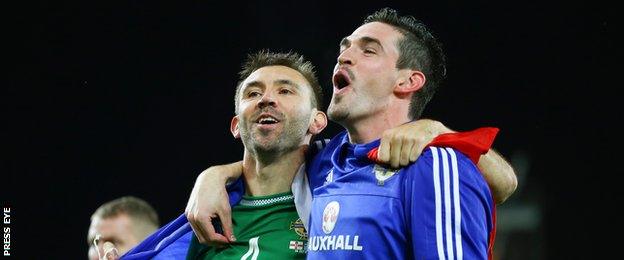
Gareth McAuley and Kyle Lafferty contributed 10 goals between them during the Euro qualifying campaign
A frank conversation between manager and player following his dismissal against Portugal in Belfast in September 2013 is credited with breathing new life into the previously suspension-prone Lafferty's international career - and since then he has shown a greater level of maturity and dependability.
Sports science and computer analysis have also been utilised to a greater extent under O'Neill's tenure, an aspect of coaching which may be taken for granted at the top level, but is deserving of note given the resources the Irish Football Association have at their disposal. The squad even bring their own chef on away trips.
Encouraged by the faith shown in him, the ex-Brechin City manager has also been quick to point out the potential dividends which could be reaped off the pitch in terms of increased finance, player development and proving an inspiration for a new generation of players.
On the back of his enhanced reputation and with his star in the ascendancy, O'Neill is likely to be on the radar of a number of clubs when his current contract expires.
But for now, the proud Northern Irishman will be fully concentrated on plotting the downfall of some of Europe's 'big guns' after the draw for the finals is made on 12 December.
Michael O'Neill factfile |
|---|
Born 5 July 1969 |
Began career with Coleraine in Irish League, before joining Newcastle United |
Played as a midfielder and forward during a 20-year playing career |
Among the clubs he played for were Dundee United, Hibernian, Coventry City, Wigan Athletic and St Johnstone |
Made 31 appearances for Northern Ireland, scoring four goals |
Was in charge of Brechin City and Shamrock Rovers, before being appointed Northern Ireland boss in December 2011 |
- Published8 October 2015
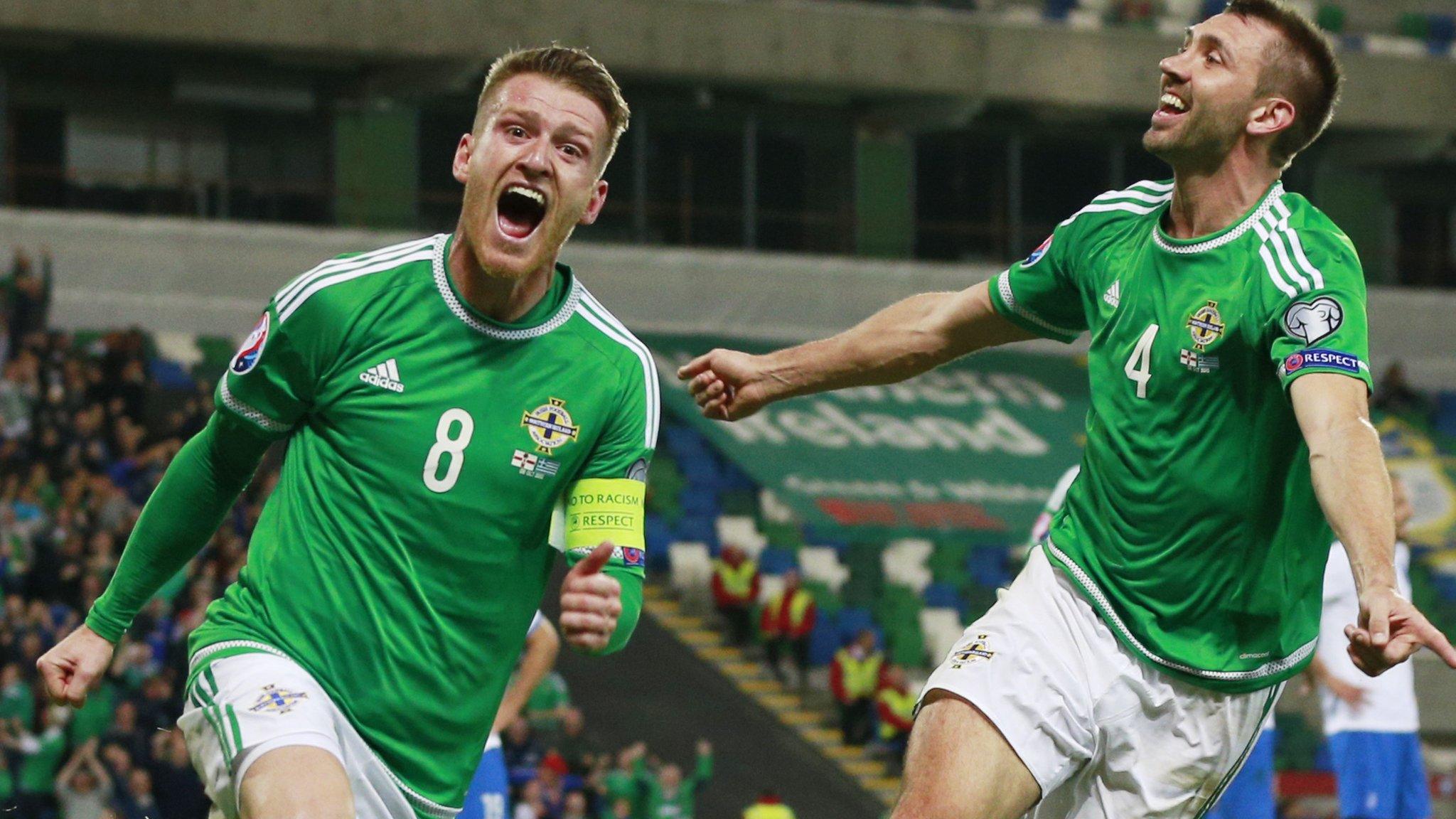
- Published9 October 2015
- Published9 October 2015
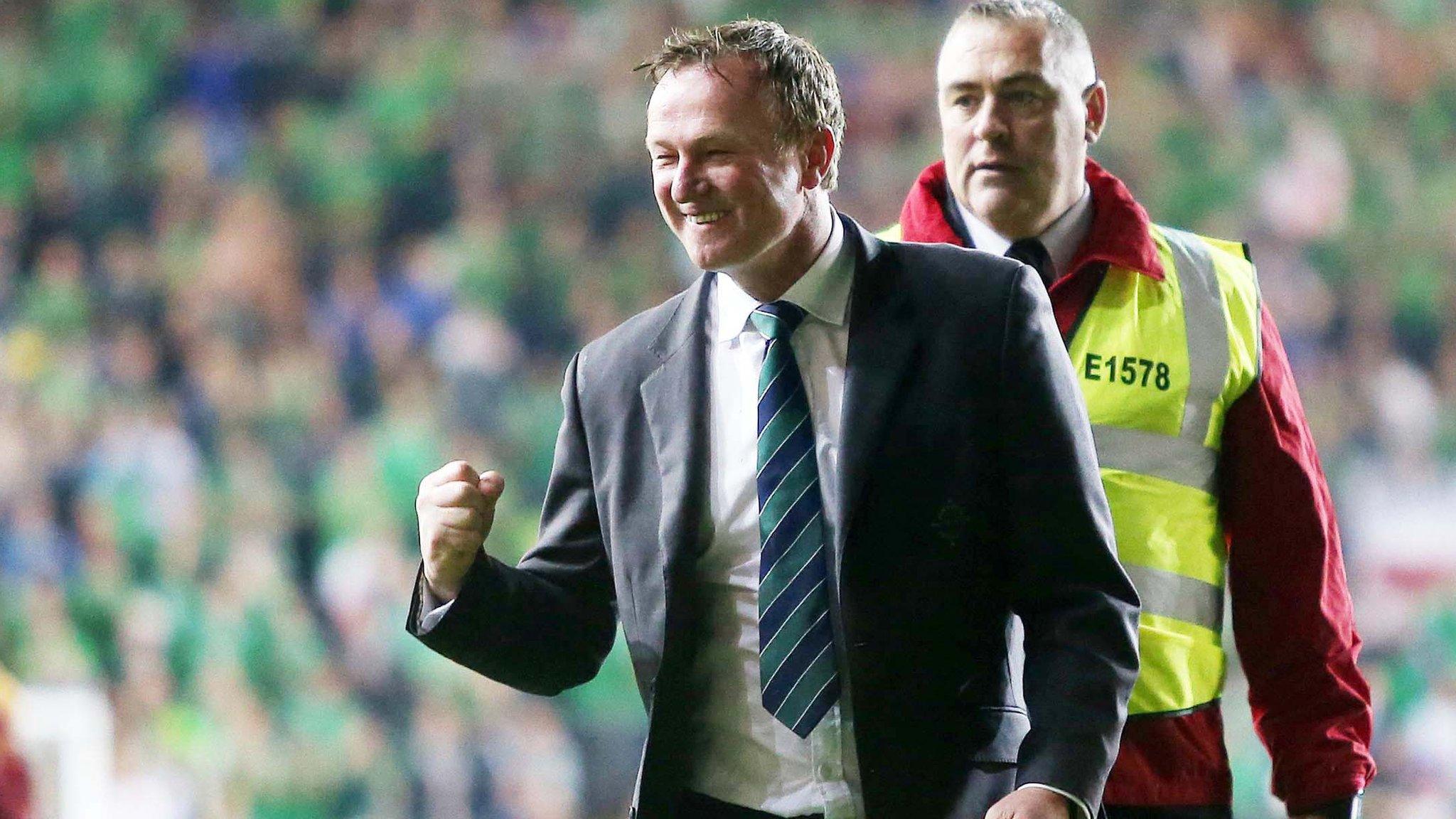
- Published9 October 2015
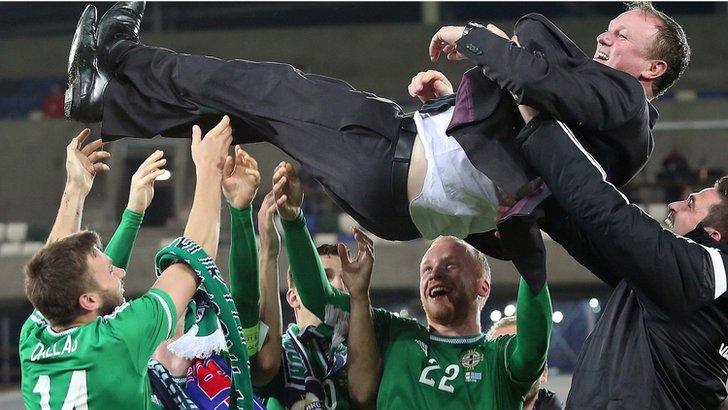
- Published9 October 2015
